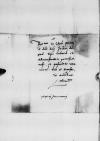Reverendissimo in Christo patri et domino, domino ⌊Ioanni⌋ Dei gratia episcopo Culmensi et administratori Pomesaniensi et postulato Warmiensi, domino et benefac[tori mod]is omnibus colendissimo
Reverendissime in Christo pater et domine, domine patrone et benefactor modis omnibus colendissime. Post mei ipsius obsequiorumque meorum in gratiam Reverendissimae Paternitatis Vestrae diligentem commendationem.
Rediit servitor meus ex ⌊Cracovia⌋, quem mitto ad Reverendissimam Paternitatem Vestram, ut ea, quae vidit et audivit in aula ⌊serenissimorum regum⌋, coram narraret. Exiverant serenissimi ⌊principes nostri⌋ ex ⌊Cracovia⌋ 6 Ianuarii et intraverunt ⌊Pyotrkoviam⌋ 11 eiusdem mensis simul et ⌊reginalis maiestas⌋. Propter dominos et amicos, qui mihi bene volunt, oportet me eo ocius ire ⌊Pyotrkoviam⌋ et iterum ad curiam Romanam mittere et expedire, quae sunt necessaria. Reverendissima Paternitas Vestra velit me diligenter commendare sacrae ⌊maiestati regiae⌋ et hoc negotium meum, quomodo ego possem pacifice et quiete permanere in beneficiis meis, a longo tempore possessis, nec quicquam superesse video praeter unicam auctoritatem regiam domini mei clementissimi, accedente nihilominus gratia Reverendissimae Paternitatis Vestrae, in qua re maiestati regiae supplico, quatenus imprimis eius maiestas regali clementia uti beneficiorum meorum unicus collator adesse dignetur atque sanctissimo pro me scribere et intercedere, ut eidem ⌊Quirino Galler⌋ principali meo adversario in ⌊Urbe⌋ silentium imponatur, ne me ad profundendum fortunas meas irritet. Cum his me et omnia mea iterum atque iterum commendo in gratiam Reverendissimae Paternitatis Vestrae, quam ⌊Christus Ihesus⌋ servet diu sospitem et felicem pro singulari consolatione mea et domus meae.

